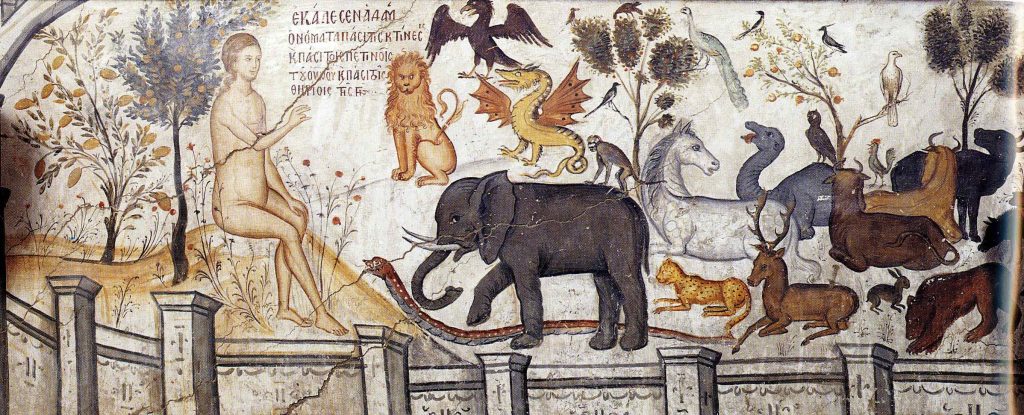Tonight we will be discussing Genesis 1:26-2:3. Within the readings this week we have the creation of human beings in God’s image. As we discuss in this section tonight, there are some additional issues to be aware of.
Plurality of God
The first thing that should jump out at us, is that God’s discussion of the creation of humanity is in the plural. God says: “Let us make humankind in our image, after our likeness.” From the Jewish perspective, the plural invokes God’s court, the heavenly host, the angelic consorts of God. These are the creatures of the heaven of heavens. These companions of God are spoken of in the prophetic visions of heaven as found in 1 Kings 22:19 and Isaiah 6 and in Psalms 29 and 82. From the Christian perspective, however, this verse necessarily invokes the Trinity. The angelic hosts did not create humanity in their image, but only God creates humanity in his image. It is only God – Father, Son, and Holy Spirit – who can create and in whose image we are created. For tonight think about in what ways we can be said to share in the image of the Father, and in the image of the Son, and in the image of the Holy Spirit.
Dominion Over Nature
God gives us dominion over nature (v.26). In pagan religions, nature is divine and has power over humanity. In Genesis, nature is stripped of its independent divinity, and humanity is freed from its control. Our dominion over nature, however, is not absolute. First this power to rule over nature is given to us by God; therefore, we rule as agents of God and not in our own right. Further, the classical idea of dominion carries with it a responsibility commensurate with the power given. Isaiah tells us that the ideal king rules with wisdom and understanding in the service of righteousness and equity, particularly towards those who are the least in society. Isa. 11. A king who exercises dominion exercises his power for the benefit of those whom he rules. On the other hand, tyranny is when the king rules for his own benefit. (This is why Thomas Jefferson was very specific in calling George III a “tyrant” because tyranny is an unjust ruler who needs not to be obeyed.) Therefore, the grant of the power of humanity over nature is, at its core, a grant of responsibility to us to rule wisely and in accordance with God’s counsel.
God’s Image as Male and Female
Another aspect of creation is that the Image of God is described as “male and female.” Both male and female are created on a level of absolute equality with God. Both men and women reflect the glory and Image of God. Humanity is to have dominion over the animals, but the male is not given this same dominion over the female. This statement also tells us that God can be presented in both male and female images. Although the Scriptures predominately use male imagery in describing God, both the Old Testament (Deut. 32:18, Psalm 123:2, 131:2, Isa. 42:14, 49:15, and 66:13) and the New Testament (Matt. 23:37 and Luke 15:8) utilize female imagery as well. As Clement of Alexandria (c.150-c.215) writes: “And God Himself is love; and out of love to us became feminine. In His ineffable essence He is Father; in His compassion to us He became Mother. The Father by loving became feminine.” Who is the Rich Man to be Saved, Ch.27
For God created us for incorruption, and made us in the image of his own eternity.
Wisdom 2:23


Pingback: The Revelation – A Review – Gen.1 – Rev. 20 – Ancient Anglican
Pingback: The Gospel of Luke – Luke 16:1-17:10 – Faithfulness in Wealth – Ancient Anglican